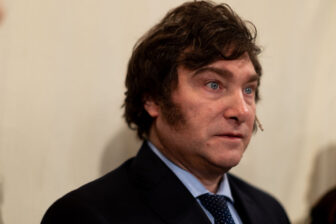On Sunday, August 13, Argentines voted in the country’s PASO elections, in the first stage of a campaign dominated by bleak economic conditions and rising public discontent. The Simultaneous and Mandatory Open Primaries (PASO in Spanish) determine presidential candidates for major parties and often serve as an indication of the potential support each party might receive in October’s first-round presidential election.
Libertarian outsider Javier Milei surprised onlookers by taking the largest share of the vote, at just over 30% with 97% of votes totaled. Patricia Bullrich, the former security minister, defeated her rival, Buenos Aires mayor Horacio Rodríguez Larreta, in the contest within center-right opposition bloc Juntos por el Cambio (JxC), the only party whose primary was seen as competitive. And Sergio Massa, the current economy minister, won 21% of the vote and will be the ruling Unión por la Patria (UP) Peronist bloc’s candidate in the first round.
Voters are enduring inflation above 115%—the highest level since 1991 and one of highest in the world—while the national currency has plunged against the U.S. dollar in the parallel market to a record low, decimating Argentines’ purchasing power and pressuring the central bank’s international reserves. After a punishing drought affected great part of the nation’s agricultural output, one of the key sectors of the South American country, the economy is heading to a 1.6% contraction this year, while the poverty rate stands at 40%.
Juan Cruz Díaz, managing director at Cefeidas Group
These electoral results have consolidated a triple-tie scenario that leaves an open end ahead of the October general elections. Although many predicted a close election, Javier Milei’s electoral performance stole the spotlight last night. Even though the libertarian leader had emerged as one of the three top contenders in the presidential race since announcing his candidacy, tonight’s numbers exceeded expectations—especially considering that Milei’s image has been tarnished by several scandals over the past month. With a strong anti-political establishment rhetoric, Milei has been able to capitalize on the prevailing dissatisfaction of much of the Argentine population with the traditional political elites, who have been unable to reverse the economic deterioration that the country has experienced in recent years.
In the opposition JxC coalition, the fierce competition between Horacio Rodríguez Larreta and Patricia Bullrich seems to have taken its toll on the coalition’s electoral performance, finishing behind Milei’s La Libertad Avanza by a narrow margin. Despite her victory over Larreta, Bullrich will still need the Buenos Aires mayor’s centrist and conciliatory image to attract more moderate votes. Former President Mauricio Macri will also play a key role in ensuring internal unity and mobilizing voters to the cause. On the other side, for the ruling UP coalition, the primaries’ results represented a severe blow. Its leading candidate, Sergio Massa, was not even able to position himself as the individually most-voted candidate of the election. However, the existing vacuum at the center of the political spectrum, along with the low turnout, leaves open the possibility of new votes being cast in favor of the ruling coalition.
These results are evidence of Argentines’ frustration with the sense of failure of recent governments from both Peronism and non-Peronist alternatives. The two main traditional coalitions are struggling to capture that sentiment, but Milei proved that he connected with it.
Going forward, Milei’s main challenge will be to consolidate the votes he won in the primaries and use the post-election momentum to further expand his vote share, and project a more robust and viable governing team. As he faces even greater exposure, the economist will also need to avoid many of the unforced errors (e.g. controversial statements) that have damaged his image in the past to reach the general election relatively unscathed. For their part, JxC and UP will have to rethink their campaign strategies to challenge Javier Milei’s unexpected leadership.
Marina dal Poggetto, executive director of Ego Go Consultants
Once again the polls in Argentina failed. Not only was Milei the candidate with the most votes, but by himself he drew more votes than the sum of the JxC and UP candidates. Milei’s votes are all his own; those of the winning JxC and UP candidates, not necessarily.
Milei capitalizes on the anger of a society fed up with Argentina’s “permanent adjustment”—and on the promise that with him for the first time the “political caste” will be the one to pay the cost of the transformation of Argentina into a market economy. This flawless message in electoral terms becomes a boomerang for a market that has reasonable doubts about the governability behind the rhetoric—especially when both JxC and UP are going to try to win by increasing polarization against Milei at the end of November.
Although in his speech after his victory, Milei did not speak of popular but controversial proposals like dollarization or scrapping the central bank, and in his last speeches prior to the election he softened his proposals, his incentives for moderation during the rest of the campaign are diluted. Ultimately, the more noise there is in the economy, the more angry votes it generates.
Without reserves in the Central Bank and with a bridge loan supposed to last until the disbursement that the IMF promised for after the PASO, Sergio Massa as candidate and minister will have to maneuver between the urgent need to fulfill his commitments to unlock the disbursements, and internal pressures within his coalition to improve on electoral chances by means of familiar strategies (exchange controls and more spending in the form of transfers to families). The rise in the informal dollar rate shows a jump in the exchange rate gap to 130%, and the pressures for a rise in the official dollar rate will increase. An inflation rate that was projected ex ante for August at 8.5% per month could jump to a double-digit level.
Brian Winter, editor-in-chief of Americas Quarterly
Analysts aren’t really supposed to say this, but: I don’t know what this result means. Especially for Argentina’s future, and the key question of governability.
Yes, the media’s focus today is on Milei—and fair enough, he’s the novedad. But look at the final numbers, which got closer overnight, with only three points separating the three main coalitions. There’s a big pool of malleable voters—abstention was a very high 31%—and two months until the voting that actually counts. Bottom line: One can still imagine any of these three candidates making the runoff, and any of the three winning.
Regarding Milei: The obvious comparisons are Donald Trump and Jair Bolsonaro. But Milei looks like even more of a “one-man band”—his allies in gubernatorial and legislative elections did poorly, and projections show Milei’s party might only control 40 out of 257 seats in Congress’ lower house. If he wins, how would he get anything done?
On a related note, I worry markets and business will draw a premature conclusion from this. Some will say “Great, nearly 60% of Argentines voted for a reformist, right-of-center candidate. No matter what happens, we’re going to get the drastic change Argentina’s economy needs.” But so much of this was clearly a protest vote, or a vote for magical solutions. Will we really come out of October with a clear mandate for ajuste, for cuts to the Argentine state? Will any of these candidates have the negotiating skill, the popular touch, and the legislative support necessary for difficult change?
I do think there are reasons to be optimistic about Argentina, and the road ahead. But this muddled, somewhat incoherent result means we still need to wait and see.
María Esperanza Casullo, professor at the National University of Río Negro
I would not want to add to what must surely be the most obvious (if true) reactions to the results—pointing to the anti-system vote, the que se vayan todos (“throw the bums out”) spirit, or the country’s sharp turn to the right. I want to point to two things. First, that the economy ended up being central to the vote. It most definitely hurt the government, which never produced a convincing explanation for the bad economic performance. But I think it also hurt Juntos por el Cambio, because people remember its economic policies, and because their candidates chose to focus on other things and never clearly presented an economic program.
Secondly, Milei’s rise also marks the failure not only of two political coalitions, but of a broader system, which showed itself to be at great distance from the pulse of the people. In this regard the abject failure of Rodríguez Larreta is striking. Former President Mauricio Macri’s right-hand man, twice elected to the powerful city of Buenos Aires (once with over 50% of the vote), with all the right credentials and an alliance with the UCR party and to Gerardo Morales (the kind of “new,” “modern” UCR figure who was supposed to be the future of the party), with all the money in the world for his campaign: He was the favorite of domestic and foreign business leaders, and of the more mainstream media—and his performance was dismal.
In fact, Juntos por el Cambio did not have a good night. They lost 2.3 million votes from 2021 to 2023. They thought they could skate to the nomination, and they had a very bloody primary fight, which in turn may have turned voters off. Milei’s vote definitely has an ideological component, but in the end there is also a clear demand for reconstituting the presidential authority, for electing somebody with clear, undivided power.
Ignacio Labaqui, senior analyst at Medley Global Advisors and professor at the Universidad Católica Argentina
Javier Milei’s stunning performance leaves a high degree of uncertainty about the outcome of the October 22 first-round presidential election. It is unclear who will be Milei’s rival in the November 19 run-off. For Sergio Massa, the main challenge will lie in courting independent voters against the backdrop of a deteriorating economic scenario. For Patricia Bullrich, Milei’s strong showing caps her ability to attract right-wing voters and she will have to appeal to a centrist vote, possibly moderating the tone of her discourse in order to retain all of Horacio Rodríguez Larreta’s voters. One lane in the run-off has been taken. Massa and Bullrich will struggle to occupy the other lane, and they have two and a half months to do it.
Yesterday’s election was a major blow for Argentina’s partisan establishment. Peronism had the worst outcome so far in a presidential election, failing to reach 30% of the vote. Juntos por el Cambio, which had obtained, just two years ago, 40% of the vote in midterm legislative elections and which stood as kirchnerismo’s main challenger, had a worse-than-expected performance at the ballot box.
A succession of failed administrations, more than a decade of economic stagnation and the worsening of the economic situation during the Alberto Fernández administration bred a growing sentiment of disenchantment among voters that resulted in one third of voters supporting a candidate who based his candidacy on blaming the partisan establishment (or the “caste” as he labeled them) as the culprit of Argentina’s problems. It also led to record low turnout in a presidential primary.
The August 13 primary brings to an end the 20-year political cycle that emerged from the April 27, 2003 presidential elections, a cycle in which kirchnerismo became Argentina’s dominant political force and in which the divide between kirchneristas and anti-kirchneristas became the main axis of Argentina’s politics.







